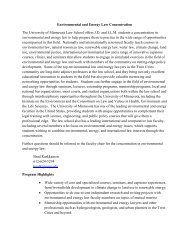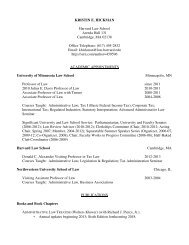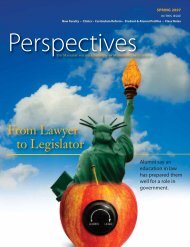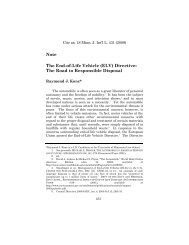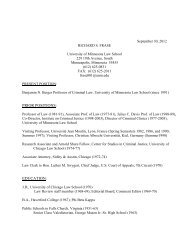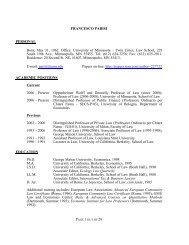Enabling Private Ordering - the University of Minnesota Law School
Enabling Private Ordering - the University of Minnesota Law School
Enabling Private Ordering - the University of Minnesota Law School
Create successful ePaper yourself
Turn your PDF publications into a flip-book with our unique Google optimized e-Paper software.
2009] UMBRELLA CLAUSES 75<br />
and application <strong>of</strong> <strong>the</strong> umbrella clause in backing up private<br />
ordering between investors and host States. While opportunistic<br />
breaches <strong>of</strong> investor-State contracts clearly constitute a breach<br />
<strong>of</strong> <strong>the</strong> umbrella clauses, reactions to contingencies do not engage<br />
<strong>the</strong> international responsibility <strong>of</strong> <strong>the</strong> host State. However, in<br />
case <strong>the</strong> host State invokes a change <strong>of</strong> circumstances in order<br />
to change <strong>the</strong> terms <strong>of</strong> an investor-State contract or to deny<br />
performance <strong>of</strong> its obligations, specific attention has to be paid<br />
to <strong>the</strong> question <strong>of</strong> whe<strong>the</strong>r a specific circumstance is within or<br />
outside <strong>the</strong> allocation <strong>of</strong> risk provided for in <strong>the</strong> original<br />
bargain. The danger, <strong>of</strong> course, exists that <strong>the</strong> host State will<br />
use changes in circumstances as a pretext in order to extract<br />
additional benefits from <strong>the</strong> initial bargain and, thus act<br />
opportunistically. Consequently, an investment tribunal will<br />
have to apply strict scrutiny in order to delineate opportunistic<br />
behavior and <strong>the</strong> good faith reaction to contingencies.<br />
Notwithstanding, umbrella clauses do not exclude <strong>the</strong><br />
invocation <strong>of</strong> doctrines addressing contingencies and<br />
consequently do not make host States liable for unforeseen<br />
future developments that are outside <strong>the</strong> contractual risk<br />
allocation.<br />
D. REGULATION AND TERMINATION OF INVESTOR-STATE<br />
CONTRACTS<br />
While doctrines relating to <strong>the</strong> change <strong>of</strong> circumstances<br />
concern <strong>the</strong> influence <strong>of</strong> future contingencies upon <strong>the</strong><br />
relationship between <strong>the</strong> parties, ano<strong>the</strong>r source <strong>of</strong> significant<br />
interference with <strong>the</strong> contractual rights under investor-State<br />
contracts is <strong>the</strong> host State’s power to regulate or even terminate<br />
contracts in <strong>the</strong> public interest. 208 Both regulation and<br />
termination in <strong>the</strong> public interest can abridge <strong>the</strong> original<br />
promises made by <strong>the</strong> host State and thus negatively influence<br />
<strong>the</strong> contractual rights <strong>of</strong> an investor. Thus, <strong>the</strong> regulation <strong>of</strong><br />
investor-State contracts—e.g. changing emission standards for a<br />
production plant run by a foreign investor—may impose<br />
additional burdens on <strong>the</strong> investor’s economic activity, make <strong>the</strong><br />
performance <strong>of</strong> its obligations more onerous, and thus affect <strong>the</strong><br />
initial contractual equilibrium. The question, <strong>the</strong>refore, arises<br />
whe<strong>the</strong>r umbrella clauses prohibit such host State measures<br />
and immunize investor-State contracts against any regulation<br />
208. Cf. COOTER & ULEN, supra note 35, at 185–87 (discussing <strong>the</strong> impact <strong>of</strong><br />
government zoning regulation on private party relationships for development).



